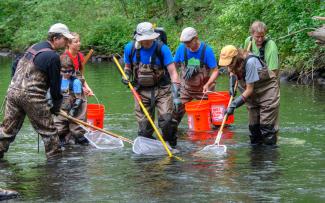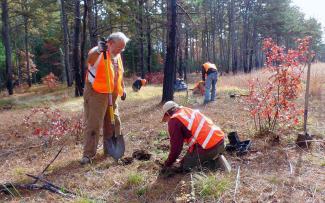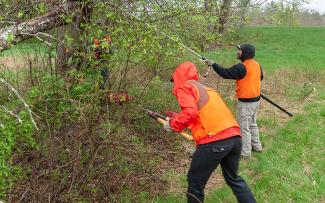Volunteer Outreach Program
The RI DEM Division of Fish & Wildlife offers volunteer opportunities throughout the year to participate in active conservation work such as wildlife monitoring, biological research, and habitat restoration through our Wildlife Conservation and Community Science Program. For all our opportunities, volunteers should be prepared to work outdoors and be exposed to new and unique experiences! Community scientists not only help us expand our knowledge about Rhode Island’s wildlife, but also contribute additional funding towards conservation work in the state by generating in-kind match. Thank you for helping conserve Rhode Island’s amazing wildlife species!
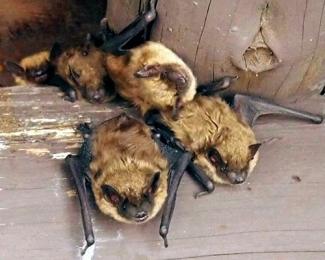
Bat Maternity Roost Surveys
Volunteers assist biologists on summer evenings by counting bats as they exit the maternity roosts where they raise their young. The studied colonies are found in several man-made structures (barns, attics, etc.) across Rhode Island. Surveys take approximately 1.5 hours and are scheduled in advance, however dates may change in the case of unfavorable weather. Volunteers should be tolerant of biting insects and must be able to see in low light conditions. Ages 8+.
Diamondback Terrapin Monitoring
Volunteers scan the shoreline at an individually assigned coastal site once a week for 9 weeks in search of Rhode Island’s only brackish water turtle, the diamondback terrapin. Participants stand on the shore and scan the water for three 5-minute surveys to spot turtle heads popping up above the water as they surface to take a breath. Volunteers must provide their own binoculars and rainboots. Many sites require walking on the uneven surface of the marsh. All Ages.
Pollinator Atlas
Volunteers carry out monthly surveys to search for, capture, and photograph bumblebees. Volunteers must attend a bumblebee ID training, then can select their survey site and carry out their non-lethal bee surveys independently. Volunteers must be able to navigate a 1 hectare-sized survey area (about the size of a football or soccer field) for 45 minutes and tolerate hot weather and biting insects. Ages 16+.
Deer Check Stations
Volunteers assist biologists as they inspect hunter-harvested deer at check stations across the state. Participants help move deer onto scales to be weighed, record data, and learn the process of aging deer by tooth-wear. Biologists also perform some dissection to remove the lymphnodes of the deer to test for Chronic Wasting Disease (CWD), a disease which has devasted deer populations in other parts of the U.S. For this opportunity, volunteers must be comfortable with the sight of blood and tissue, but do not have to actively participate in the dissection. Ages 15+.
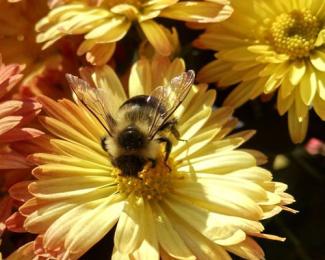
Clean Up Events
Volunteers help pick up trash during group clean-up events in Wildlife Management Areas (WMAs) throughout the year. WMAs are protected as habitat for Rhode Island’s plants and animals, so keeping these spaces pristine is essential to the health of our native wildlife populations. All Ages.
Habitat Enhancement
Volunteers assist with removal of invasive plants that outcompete the native species, which our native wildlife relies on. Volunteers may also help plant native species to bolster local populations and restore or improve wildlife habitat. This work ranges from salt marsh restorations to planting buffers on inland forest edges. All Ages.
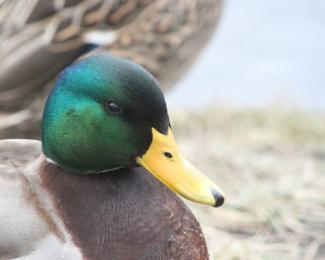
Waterfowl Banding
Volunteers assist biologists with capturing and banding ducks and geese. Before release, a unique identification band is closed around the leg of each bird to provide information on movements, population trends, and harvest rates. Volunteers have the opportunity to participate in all parts of the process but must be able to tolerate extreme weather conditions. Ages 15+.
River Herring Counts
Volunteers count fish during 10-minute surveys at fish ladders located across the state as they make their annual migration upstream to spawn. Volunteers must attend a training before participating and then survey independently at their convenience. All Ages.
Bat Maternity Roost Surveys
Volunteers assist biologists on summer evenings by counting bats as they exit the maternity roosts where they raise their young. The studied colonies are found in several man-made structures (barns, attics, etc.) across Rhode Island. Surveys take approximately 1.5 hours and are scheduled in advance, however dates may change in the case of unfavorable weather. Volunteers should be tolerant of biting insects and must be able to see in low light conditions. Ages 8+.
Diamondback Terrapin Monitoring
Volunteers scan the shoreline at an individually assigned coastal site once a week for 9 weeks in search of Rhode Island’s only brackish water turtle, the diamondback terrapin. Participants stand on the shore and scan the water for three 5-minute surveys to spot turtle heads popping up above the water as they surface to take a breath. Volunteers must provide their own binoculars and rainboots. Many sites require walking on the uneven surface of the marsh. All Ages.
Pollinator Atlas
Volunteers carry out monthly surveys to search for, capture, and photograph bumblebees. Volunteers must attend a bumblebee ID training, then can select their survey site and carry out their non-lethal bee surveys independently. Volunteers must be able to navigate a 1 hectare-sized survey area (about the size of a football or soccer field) for 45 minutes and tolerate hot weather and biting insects. Ages 16+.
Deer Check Stations
Volunteers assist biologists as they inspect hunter-harvested deer at check stations across the state. Participants help move deer onto scales to be weighed, record data, and learn the process of aging deer by tooth wear. Biologists also perform some dissection to remove the lymphnodes of the deer to test for Chronic Wasting Disease (CWD), a disease that has devasted deer populations in other parts of the U.S. For this opportunity, volunteers must be comfortable with the sight of blood and tissue but do not have to actively participate in the dissection. Ages 15+.
Interested in volunteering? Contact Wildlife Outreach Coordinator Jennifer Brooks at dem.dfwvolunteer@dem.ri.gov
Habitat Maintenance
Volunteers assist with removal of invasive plants that outcompete the native species which our native wildlife relies on. Volunteers may also help plant native species to bolster local populations and restore or improve wildlife habitat.
Clean Up Events
Volunteers help pick up trash during group clean up events on Wildlife Management Areas that are dedicated as wildlife habitat.
Deer Check Stations: first weekends of November & December
Volunteers assist biologists as they inspect hunter-harvested deer at check stations across the state during the first weekend of the muzzleloader season and shotgun season. Participants will help move deer onto scales to be weighed, record data, and learn the process of aging deer by tooth-wear. Biologists also perform some dissection to remove the lymphnodes of the deer to test for Chronic Wasting Disease (CWD), a disease which has devasted deer populations in other parts of the U.S. For this opportunity, volunteers must be comfortable with the sight of blood and tissue but do not have to actively participate in the dissection. Ages 15+.
Data collected through check stations provides information on the health of Rhode Island’s deer herd which will guide future management decisions. Although CWD has not yet been found in Rhode Island, early detection is crucial to containing the spread of this destructive disease should it arrive.
Mid-Winter Waterfowl Survey: First week of January
Volunteers are assigned to a regional group leader who organizes individuals into pairs to survey waterfowl across Rhode Island’s coastline for a one-day survey. Volunteers must be confident in their waterfowl identification skills and be prepared to work in freezing and windy conditions.
This survey is run in sync with our aerial waterfowl survey to ensure we have an accurate count of the species that are present. These surveys provide information on the number and distribution of waterfowl that occur in the state during the winter. These birds will migrate back up to their northern breeding grounds in Canada come spring.
Duck Banding: February-Mid-March
Volunteers assist biologists with the trapping of ducks on saltmarshes across southern Rhode Island. Once captured, a unique identification band is closed around the leg of each bird to provide information on their movements, population trends and harvest rates. Volunteers should be prepared to arrive pre-dawn and work in freezing and windy conditions. Training will be provided on how to band, age and sex birds during this hands-on experience. Ages 15+.
Data collected from this project is shared across the Atlantic Flyway, an organization that helps conserve waterfowl and their habitats. Examining data on the health of duck populations across their range helps guide future management decisions including setting bag limits, seasons, and identifying core conservation areas.
Rhode Island Bumblebee Survey: March – October
Volunteers carry out monthly surveys to search for, capture, and photograph bumblebees. Data on the species, sex, habitat type, and foraging choice is entered through the Survey123 program which can be accessed through the smartphone app or online. Volunteers must attend a bumblebee ID training, then can select their survey site and carry out their non-lethal bee surveys independently. Volunteers must be able to navigate a 1 hectare-sized survey area (about the size of a football or soccer field) for 45 minutes during each survey. They should also be able to tolerate hot weather and biting insects. Ages 16+.
Bumblebees are important pollinators of both wild and crop plants but, unfortunately, global bumblebee populations are declining due to environmental threats, such as land use change and climate change. By carrying out these surveys, volunteers will be helping biologists learn more about the status, distribution, and abundance of Rhode Island’s bumblebees, as well as the floral species and habitats associated with these species. This will help inform future management efforts to protect these pollinators.
River Herring Counts: April-end of May
Volunteers count fish during 10-minute surveys at fish ladders located across the state as they make their annual migration upstream to spawn. Volunteers must attend a training before participating and then survey independently at their convenience.
With the explosion of dam construction during the industrial revolution, river herring were almost completely wiped out from our state. The creation of dams made the herring’s annual spawning migration virtually impossible, and as a result, their populations hit a devastating low. Fisheries biologists and engineers have worked together to create fish passages and remove dams, in an effort to restore these historic runs. Today’s Rhode Island herring are still struggling to reestablish themselves. Annual fish counts help biologists to collect valuable data to determine the population status in the state.
Turkey Gobbler Surveys: First three weeks of April
Volunteers independently drive a designated 12-mile long route twice a week before sunrise to listen for the sound of turkeys gobbling. Volunteers must commit to completing all 6 surveys and have access to a vehicle to drive their route. A training will be provided prior to participating. Surveys can be performed on whatever two days are most convenient for the volunteer each week.
Turkey Gobbler Surveys were established in 1993 to monitor the health of Rhode Island’s turkey population. These surveys are performed each spring to determine the number of breeding males, or “gobblers.” The data collected by volunteers allows biologists to make informed management decisions.
Diamondback Terrapin Monitoring: May-end of July
Volunteers scan the shoreline at an individually assigned coastal site once a week for 9 weeks in search of Rhode Island’s only brackish water turtle, the diamondback terrapin. Participants stand on the shore and scan the water for three 5-minute surveys to spot turtle heads popping up above the water as they surface to take a breath. Volunteers must provide their own binoculars and rainboots. Many sites require walking on the uneven
surface of the marsh.
After severe declines due to habitat loss, over-harvest and poaching, diamondback terrapins were listed as state-endangered in Rhode Island. Thanks to a combination of legal protections and a massive citizen-led conservation effort through the Barrington Land Conservation Trust, the diamondback terrapin population in Rhode Island is starting to recover. These surveys will help identify new populations and contribute important
information on how to best conserve these unique turtles.
Bat Maternity Roost Counts: May-July
Volunteers assist biologists on summer evenings by counting bats as they exit the maternity roosts where they raise their young. The studied colonies are found in several man-made structures (barns, attics, etc.) across Rhode Island. Surveys take approximately 1.5 hours and are scheduled in advance, however dates may change in the case of unfavorable weather. Volunteers should be tolerant of biting insects and must be able to
see in low light conditions.
Over the past 10 years, bat populations have been in serious decline, largely due to a fungal disease, called White-nose Syndrome. Other factors such as habitat loss and pesticides, have also had a negative impact on our native species. Monitoring and protecting our remaining bat colonies is very important to their survival.
Goose Banding: Last two weeks of June
Volunteers assist biologists with capturing and banding resident Canada geese. Once captured, a unique identification band is closed around the leg of each bird to provide information on their movements, population trends and harvest rates. Volunteers have the opportunity to participate in all parts of the process including corralling birds by kayak, banding, sexing and entering data. Volunteers must be able to tolerate working in hot weather conditions and should be prepared to have clothing soiled by mud and goose droppings. This is one the most hands-on opportunities that we offer. Ages 15+.
Banding waterfowl helps biologist learn about the migration patterns of these animals, and gives insight into the life of individual birds. When these birds are re-sighted, harvested, or found, band numbers can be entered into a federal database, and the bird’s general age and banding location can be recovered. For birds banded during their first year, the information is even more accurate, as the actual age and birthplace of the bird can be determined.
HERP OBSERVER: (Year-round)
Securely submit your sightings of frogs, toads, salamanders, snakes and turtles to RI’s State Herpetologist (reptile and amphibian biologist)! Observations of species both common and rare are welcome. This survey will help biologists identify where these animals are in the state, and in turn, where they should focus conservation efforts for RI’s scaley and slimy critters!
Rreport reptile and amphibian sightings
WILD TURKEY BROOD SURVEY: (July 1st - August 31st)
Have you seen a turkey over the past few weeks? Your state biologists want to know! The goal of this survey is to collect a total of 300 sightings of turkey hens (females), toms (males) and poults (young). The data gathered from the community will provide insight into the health of RI’s turkey population. Follow along with real-time submissions
Report turkey sightings
SUMMER DEER SURVEY: (August 1st - September 30th)
Citizen scientists are needed to help spot does (females), bucks (males) and fawns (young) across Rhode Island! Observations will help provide data on fawn to doe ratios and reproductive success. This information will help ensure that management decisions continue to support a healthy deer herd in the state. Photos are optional but recommended where possible.
Report deer sightings
How to download the Survey123 app on your smartphone:
If you expect to report observations frequently, we recommend downloading the FREE Survey123 app on your smartphone for ease of access for future wildlife reporting.
Step 1: Navigate to the app store on your smartphone and download Survey123. (You will only need to download the app once.)
Step 2: Once the app is installed, open the browser on your smartphone and navigate to www.dem.ri.gov/reportwildlife for further instructions. If viewing this document on your smartphone, you can simply click on the survey links listed below and, when prompted, select the option to “open in the Survey123 Field App”:
- Herp Observer: https://arcg.is/1P1X9r0
- Wild Turkey Brood Survey: http://arcg.is/0r48a50
- Summer Deer Survey: https://arcg.is/1SCKWi0
Step 3: The survey will automatically download and will remain in the Survey123 app from that point on, so you can enter future observations by simply opening the Survey123 app on your phone! Repeat steps 2 & 3 for each of the surveys to download all three into your Survey123 app to easily report all of your wildlife observations.
The mission of DEM Division of Fish & Wildlife's ARE program is to create environmental stewards and a well-informed public willing to appreciate and conserve their aquatic resources. Activities include teacher training workshops, marine and freshwater ecology programs, in-school aquaculture programs, literature publication, and angling training for youths and families. The ARE program relies on in-kind volunteer match to receive federal grant funds.
Volunteer participation varies depending on the event.
- A recreational fishing event which includes school, scout, or special needs groups will use teachers and chaperones as organizational volunteers to assist with monitoring and with the fishing activities.
- Qualified volunteers for fishing events such as surf fishing programs, fly fishing introductory workshops, and fly tying workshops, that require specialized skills may be sourced from fishing clubs such as the United Fly Tyers, Trout Unlimited, and Narragansett Surfcasters.
- The ARE Coordinator also obtains qualified volunteers from individuals expressing an interest in teaching angling skills to youth and adults.
Any person interested in volunteering as an instructor must contact the Aquatic Resource Education Coordinator at Kimberly.Sullivan@dem.ri.gov.
The Rhode Island Division of Fish & Wildlife's Hunter Education Program is always looking for qualified individuals who would like to become instructors or assistants in the hunter education programs. The following are the qualifications and duties of volunteer instructors.
INSTRUCTOR CERTIFICATION REQUIREMENTS - FIREARMS AND ARCHERY
An eligible applicant must:
- Be twenty-one years of age or older
- Have at least three years of hunting experience
- Have no felony convictions, conservation convictions or serious misdemeanors within the last five years.
- Undergo background investigation
- Be a Hunter Education or Bowhunter Education Course graduate
- Be a high school graduate or possess an equivalency certificate
- Obtain an Instructor Application and Background Check Waiver Form from the Hunter Education Office.
- Complete the forms and return to the Hunter Education Office along with two letters of reference.
- Upon receipt of the above mentioned material, we will review and contact you to set up a brief interview.
- The successful applicant will then be required to team-teach with experienced instructors as well as attend state sponsored training sessions as they are offered.
Please contact Madison.proulx@dem.ri.gov for Instructor application.

